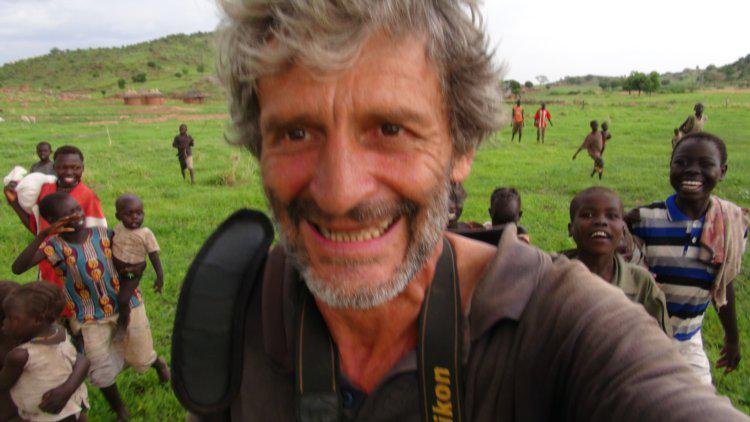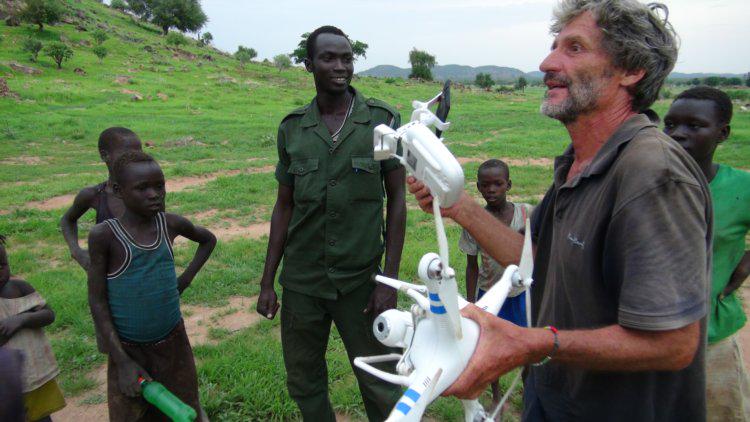I was upset because people here misunderstand other cultures, and by the prevailing stereotypes, especially aimed at indigenous people.

This year Križnar was chosen by the international Foundation Ethics & Economy, ethecon, as the winner of the Blue Planet award. The Blue Planet Award honours for the preservation and rescue of the Blue Planet. The award is given to people who are truly committed to protection of human ethics.
At this occasion MMC had a chat with Križnar. Conversations with him are always intriguing; he talks with enthusiasm about his travels to Africa, and he is selflessly venturing to dangerous zones not only to protect indigenous people, but to teach them to defend themselves from oppressors, be they Arabs, Chinese, or Europeans, trying to seize their land, and the natural resources it hides within.
You give impression that awards don't mean much to you, and that you place more importance to the satisfaction of people you have been helping selflessly. Yet, this international award is the recognition of your long-time effort. So allow me a rather cliché question - with what feelings are you heading for the ceremony?
The award giving ceremony will be held only in March, so I am not afraid yet. I am afraid I will have to dress up, behave politely, and should be diplomatic in what I say - but I won't. People are not aware that giving awards is not enough, much more has to be done. It is necessary to go to Africa, to Sahel, and tell the world what is going on there. It is necessary to help, so that people won't have to flee to Europe, but create conditions which would enable them to work and support their families at home. The time has come for actions, not discussions. But the award ceremony will give me the opportunity to inform the public with the actual conditions, and to call for action. I do feel satisfaction that we had been noticed, but we should have noticed by those who have the power to act! I do hold hope that due to this award my voice will be heard. We needed a long time to start protecting endangered animal species, and obviously the innocent human indigenous way of life will be the last in line. I fear the reason is the fact that we still feel endangered by them, although they had already been beaten.
You started travelling as a student, but obviously just wandering around the world didn't satisfy you. In 1985 you went as a volunteer to refugee camps in Pakistan, India, Sri Lanka. What happened, or what influenced you?
I am an emotional and sensitive person, and I was not able to forget once I returned into our bunker in the North of the planet. I was haunted by the images of the victims of the European domination, both colonial and neo-colonial imperialism. I was upset because people here misunderstand other cultures, and by the prevailing stereotypes, especially aimed at indigenous people. A number of books have been written about foreign people, but all from the eurocentric point of view. I felt the need to talk about my own experiences from my travels to Iran, Afghanistan, Indonesia, the Central America; people there invite you into their homes, and they give, instead of trying to take. And what they give happen to be the stories from their history, and what we white people did to them. It reminds me of the Roman Empire, which crumbled not because of the barbarians at the empire borders, but because of the decay from the inside, and the general exaggeration of the last elites. I notice the same materialistic attitude by us. We look down upon people living down there, the historical victims of our conquests, and consider them dangerous, and a threat to ourselves.
Media stopped talking about Darfur. Does it mean the conditions there have settled?
No, the conditions in Darfur remain unsettled. The extermination of indigenous people of African identity at Darfur is still going on, either by bombarding from air, or by land attacks, just as the extermination of African indigenous people from the Nuba Mountains, the Blue Nile and Abjeje is continuing.
You started using innovative technology in your work, from cameras to drones. Has your work become easier?
In our experience more than one thousand different cameras which we managed to smuggle, with the help of Klemen Mihelič from the HOPE humanitarian organisation, and the supporters from our Foundation, to the border between the two Sudans, from Darfur over the Nuba Mountains all the way to the Blue Nile, indeed stop criminals from committing the worst atrocities. They fear their actions might be documented, e.g. impaling people on stake, ripping stomachs, and consequently trigger a negative response, expose them, and set off reactions from the complacent world community. But the cameras can't stop extermination of indigenous people in Sudan, supported not only by the world war masters, but the entire »civilized world«, which persists in its ethnocentric vanity and superiority. It remains silent, just as it did in the previous centuries when on other continents extermination of the American Indians, or Australian aborigines was happening.
We are experimenting with drones recording from the sky, hoping to call to our aid the reactions by the widest masses of the overindulged world. From the air we are recording toy-like villages, rituals of gratitude for good crops, and rituals inviting rain and fertility. Plus weddings and deaths, and everything else we hope might show to the sensitive civilized people who and what is dying on the sacrificial altar of the world, and what is the world turning into. Nowadays drones with cameras protect wild beasts from poachers – lions and crocodiles. Not only elephants and gorillas as in the Congo – they protect indigenous people living in "reservations" of Sudan. We trust they can protect them. We can save our roots, and potent seeds for a post-cataclysmic world, when hopefully humankind will start searching for the human within. It can be done – if only a critical mass of people make the right decision.
I was upset because people here misunderstand other cultures, and by the prevailing stereotypes, especially aimed at indigenous people.



































































